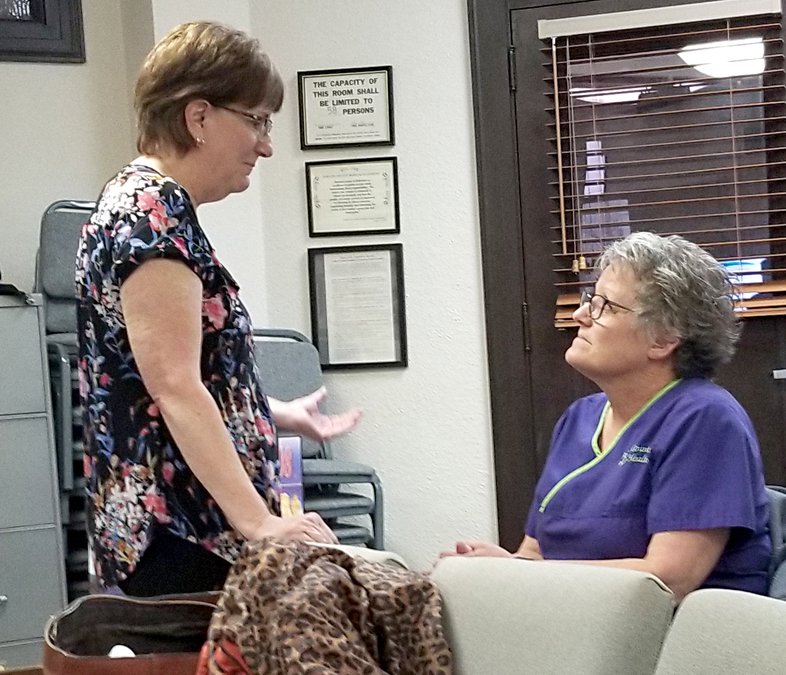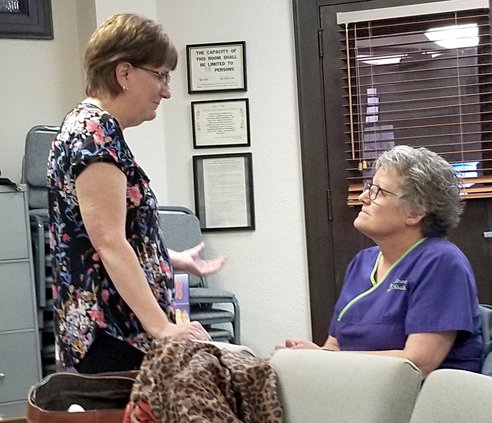There were three takeaways from the coronavirus update presented to Barton County commissioners, meeting as the Board of Health, Monday morning. But, there were also a lot of questions.
First, “right now, Great Bend is OK,” Acting Barton County Health Director Karen Winkelman said of the respiratory disease dubbed covid-19. “We just have to take care.”
“The number one priority of our work at the Barton County Health Department is the safety and well-being of the residents of Barton County,” she said. “Public Health is in a unique position to be instrumental in the containment, mitigation and recovery during this time of uncertainty.”
Admittedly, Winkelman said her update will likely be outdated before the day was through as the world works through this pandemic.
“Our community is operating under great stress and anxiety,” Winkelman said. “It is our duty as public health to assure you that every effort is being taken on our part to provide calmness in this situation.
“Remind each other that everything will be OK,” she said. “Be informed, be patient, follow guidance from the experts, take care of yourself and others, use common sense, ask and answer questions, provide trust. We all have a part in this. We must work together and do our part.”
Second, “it’s not really a matter of if it gets here, its a matter of when,” said Dr. Stanley Hatesohl, who was named by the Health Board as medical consultant to Winkelman Monday morning. “We have to delay this, or keep it from spiking because it is during that spike that we will be inundated with patients.”
This may draw things out, but it won’t swamp limited resources, he said. “We may be out of school much longer than two weeks,” he said, noting the students can be carriers of the illness.
And lastly, it is not because people are getting hysterical or because they believe that the virus is so deadly that they are panicking, she said of health officials. “It is because we only have so much capacity to deal with a lot of very sick people. If we can delay the spread by keeping people away from each other, we have a chance to help people more effectively and not overwhelm hospitals and infrastructure.”
These are only so many nurses, doctors, hospital beds, and pieces of equipment to help people that may eventually get virus related pneumonia, she said. “This is a public health strategy by CDC not mass hysteria or over reaction.”
Even so, Hatesohl said it is likely this could go on into the summer months. Some other coronaviruses, die out in the heat of summer, like the flu, but officials don’t know about this one.
“Testing is going to be key, Hatesohl said. “I think our testing supplies are pretty limited. If you know whose got it, you can separate them.”
The test, which involves a nasal swab, has to be sent to the Kansas Department of Health and Environment and it can take two days to get the results due to the current backlog.
As for canceling events, duration, they are being asked to look at events through the end of September, Winkelman said. “That’s not in stone, we just don’t know.”
That leads to questions about closings, she said. “We are not giving that definite ‘you need to close or you need to not have that event.’ We’ll have a discussion with the person or the group,” and they can draw their own conclusions on how to best protect the public.
“There are a lot of people who are panicking over it, and that’s a bad thing,” Commissioner Don Davis said. “The common sense factor comes to mind.”
Hatesohl said University of Kansas Health System is asking those who may have been exposed to come to its St. Rose Pavilion location, and let them know when they arrive. They have a special isolation area.
If someone doesn’t have a fever or serious symptoms, he said stay should just stay home and see if they can ride it out.
They just advised having prescription and nonprescription medications on hand, disinfectant wipes and sprays and basic staples.
A lot of concerns
Sheriff Brian Bellendir is worried about the jail, and the potential for a staff shortage due to covid-19. He is also concerned about the supply of masks and protective gear, and his limited abiity to isolate sick inmates.
The Barton County Sheriff’s Office will suspend visitation at the Barton County Jail until further notice.
Rosewood Services Executive Director Tammy Hammond, whose agency serves special needs clients, had similar concerns. And. much like nursing homes, she serves individuals who are at high risk.
It was baptism by fire for Winkelman. Shortly before her presentation, she was named to her post during the regular commission meeting. Winkelman, Barton County Health Department public health nurse supervisor and deputy local health officer with 23 years experience, replaces Shelly Schneider who abruptly resigned late Friday afternoon.
“We continue with direct communication with Kansas Department of Health and Environment,” Winkelman said. They are providing us with guidance and support. This is occurring on a minute by minute basis via updates on their home page, conference calls, emails, alerts, etc.
“We have ongoing communication with our local officials, county and city,” she said. Education is being provided to the community via signage and technology, and a hotline has been established so callers to the health department have immediate access to resources from the state level.
She said meetings are being held with the county’s ESF-8 Group which is the medical portion of the Emergency Response Team. Typically these meetings are held quarterly but at this time are more frequently.
This group includes public health, health care providers, EMS, mental health, hospitals, assisted living, nursing home, county officials, emergency management, communications, law enforcement and other entities.
In addition, healthcare facilities have access to Barton County Health Department staff 24/7 via phone or by calling the administration line at Communications.
“If a person presents to a medical provider and meets specific criteria, that person is considered a person under investigation,” Winkelman said. Contact with KDHE will be made by the medical provider to coordinate testing if indicated. Barton County Health Department will be notified. The person will be isolated out of caution until testing is complete.
“While awaiting test results, we will interview the PUI to create a detailed timeline of where he/she went while potentially infectious,” she said. This is called creating the potential contact list.
The testing is currently only available at health care providers, not at health department. That could change, Winkelman said, adding she is waiting on word from KDHE.
But, supplies of the tests is an issue. Commercial test kits may soon be available.
There were also questions about who is responsible for coordinating supplies and other information. Right now, Emergency Manager Amy Miller said Health and Human Services is the incident manager at the federal level, and KDHE and the Kansas Department of Emergency Management.
The county has held table top exercises, Winkelman said, and these have been beneficial for the partners to acquaint themselves with each other. This will also help identifying where the supplies are.
Background
Based on the available science around coronaviruses, CDC suggests that the incubation period ranges from 2-14 days, she said.
Some people may contract the disease and only be carrier and other might have a mild case and not even know they are sick, Winkelman said.
“If the test result is negative, nothing further is done with the potential contact list and the “person under investigation” can return to normal activity. But, if the test result is positive, people on the potential contact list will be contacted by public health and informed of the situation and asked to self-monitor for 14 days after the last close contact.
“Isolation and/or quarantine measures will be followed if needed, per statutes pertaining to public health and per guidance from KDHE,” Winkelman said. Constant communication with KDHE will be had regarding the infected person and follow up will be done until the person is deemed noninfectious and out of isolation.
“This all sounds labor and time intensive and it is,” she said. “But again by following through with this guidance and with these recommendations, we are better able to protect the health of our community.”
However, “this cannot be done alone. We are relying heavily on our community partners,” she said. “Many are faced with making tough decisions and we appreciate everyone’s efforts.”
What about the impact of protective measures?
The novel coronavirus, now called COVID-19, is a new virus that causes respiratory illness in people and can spread from person to person. Novel- meaning “new” as in people do not have immunity, no vaccine to this date, no medications specifically approved for this virus. However, most people with mild illness will recover on their own by drinking plenty of fluids, resting and taking pain and fever medications.
The outbreak first started in Wuhan, China, but now cases have been identified globally. The first case in the United States was announced Jan. 21. The first case in Kansas was on March 7, in Johnson County. Last Thursday, Gov. Laura Kelly issued an emergency declaration for the state. The declaration authorizes the use of state resources and personnel to assist with response and recovery operation in affected counties that meet certain criteria.
Symptoms reported have been mild to severe respiratory illness with symptoms of: fever, cough and shortness of breath. In severe cases, infection can cause bronchitis, pneumonia, severe acute respiratory syndrome, kidney failure and even death. From what we know so far, illness seems to be more severe in older individuals and in people with other health conditions.
So how does it spread? Health experts are still learning, she said.
Other coronaviruses spread from an infected person after they start to show symptoms to others through the air by coughing and sneezing, close personal contact, touching a contaminated object or surface, and in rare cases, contact with feces.




